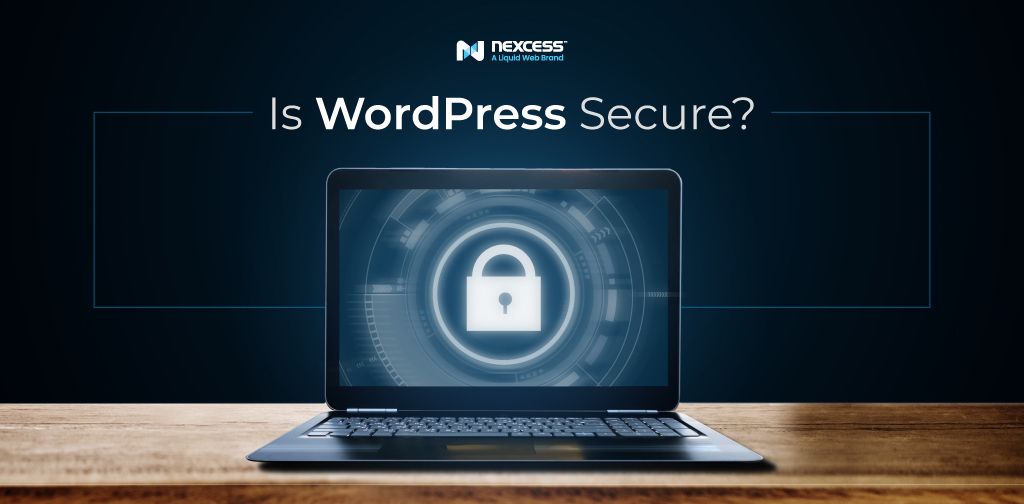More than 40 percent of websites run on WordPress. But is WordPress secure?
Yes, WordPress is secure if you follow the best security practices. But, the popularity of WordPress makes it a frequent and easy target for hackers. In this guide on WordPress security, we’ll review the most common security vulnerabilities and what you can do to protect your WordPress website.
WordPress Security Vulnerabilities
WordPress isn’t a perfect platform. If you’re questioning whether WordPress is secure, you need to understand the system’s weaknesses.
Common WordPress security concerns include:
- Weak Passwords. Using a weak password or the same password for multiple accounts or websites increases the chances of someone accessing your WordPress admin.
- Outdated Core Software. If you’re not regularly updating your WordPress version, you could be missing vital security patches.
- Undefined User Roles. The default role for creating a user gives them full admin access. Thus, limiting the number of users with admin access increases security.
- Outdated Themes and Plugins. Like your WordPress core system, you need to keep any themes and plugins updated to have the latest security patches and features.
- Unused Plugins. Plugins are the largest source of security issues. Having outdated or unused plugins on your WordPress site is like leaving the door to your house unlocked. It’s an unnecessary risk.
- Incorrect File Permissions. Misconfigured file permissions settings give hackers easier access to make changes to your files. WordPress system files should have a 644 value for file permissions, while folders need 755 as their permission.
- Insecure Web Hosting. Your web host should provide some security protections. Using a managed WordPress hosting service provides an extra security layer that incorporates some best practices, like file settings.
Types of WordPress Security Breaches
Hackers use common vulnerabilities, like the ones listed above, to try to access your site. But they use these weaknesses in different ways.
Common types of attacks on WordPress sites:
- Brute Force Attacks. The brute force attack method targets the WordPress login page because it is the easiest way to access your website. A bot will use trial and error to enter different username and password combinations until it unlocks your site. Even if the attacker doesn’t manage to guess your login, the attack can easily overwhelm your server.
- File Inclusion Exploits. These attacks exploit vulnerabilities in the PHP code running WordPress and any plugins. Attackers load and execute remote files, allowing them to modify important WordPress system files like the wp-config.php file.
- SQL Injections. WordPress utilizes a MySQL database to operate. When attackers gain access to your database, they can create new admin login accounts or insert new data, such as links to spam.
- Cross-Site Scripting. Attackers exploit vulnerabilities in WordPress logins to load JavaScript onto your site. The script can modify the way your site acts and even steal sensitive data from your website visitors.
- Malware. Malicious software is a common problem for all websites. The most prevalent malware infections for WordPress are backdoors, drive-by downloads, pharma hacks, and malicious redirects.
How to Make Your WordPress Website More Secure
While WordPress is relatively secure, you still don’t want to leave your site vulnerable to attacks. Below is our advice for decreasing the chances of a successful attack.
Stay Current on Updates
As attackers find vulnerabilities in the WordPress system, plugins, or themes, developers become aware and publish security patches. If you’re not updating to the latest version of WordPress, you’re missing out on vital security patches. You’ll also need to update your plugins and themes.
Check Your Plugins
Most concerns are not with the WordPress platform itself, but instead with the plugins you add to your site, according to Patchstack’s database of WordPress vulnerabilities. Plugins account for 89% of known vulnerabilities. In addition to keeping plugins updated, remove unused plugins. Also, only install plugins from a trusted source.
Safeguard Your Logins
Accessing your WordPress admin through your login page is the easiest way for an attacker to get into your site.
Decrease the chances of a login hack by:
- Using strong passwords.
- Setting up two-factor authentication, so you’ll need to get a code sent to your email or text message to complete your login.
- Activating WP Brute Force Protection, a plugin that limits login attempts, so bots cannot make brute force attacks.
Use a Security Plugin
All Nexcess managed WordPress hosting plans include Solid Security Pro the top plugin choice for protecting and securing your WordPress site. Managed hosting plans also include WordPress and plugin updates to ensure your site is safe.
Regularly Scan for Malware
Running a malware scan regularly ensures you can catch and fix an issue before it gets out of control. The Solid Security Pro plugin includes a malware scanner to report on your website’s malware status.
So, is WordPress Secure?
WordPress is as secure as you make it. Keeping your system up-to-date and following basic security best practices, such as using strong passwords, can significantly reduce your security risks.
For the utmost protection, consider using Nexcess Managed WordPress hosting. Security features and industry best practices come with every plan. From automatic updates to the Solid Security Pro plugin, managed hosting plans are the best choice for business owners. Each plan also includes daily backups, so if hackers breach your site, you can restore a healthy version quickly.
WordPress is the most popular content management system, so WordPress sites will always be a frequent target of attackers. But, with the proper protection in place, WordPress can be a secure system for your website. Ready to learn more about Nexcess’s managed hosting?
Check out our plans to get started today.

